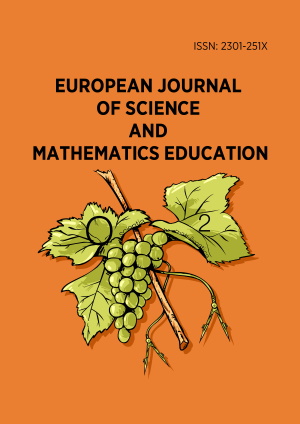Research Article
Estimation of uncertainty for problem solving by fuzzy mathematics tools
More Detail
1 Department of Informatics in Transport, Jan Perner Transport Faculty, Pardubice, Czech Republic* Corresponding Author
European Journal of Science and Mathematics Education, 2(2A), June 2014, 144-152, https://doi.org/10.30935/scimath/9637
OPEN ACCESS 2300 Views 1326 Downloads
ABSTRACT
The occurrence of uncertainty should be taken into consideration at all stages of solving research problems, from assignment to evaluation. The aim of this paper is to show possibilities of processing and evaluation of experiment based on the analysis of uncertainty using fuzzy math. We will mainly focus on the cases where it is impossible to evaluate results of experiment using standard statistical methods, due to the small extent of the investigation file. For example, this situation occurs very often with specialized training, not only in technical colleges. The paper will also feature a sample of an evaluation experiment concerning the extent of realization of chosen teaching methods of numerical math, which took place in the previous academic year at the Transport Faculty of the University of Pardubice.
CITATION (APA)
Kulička, J. (2014). Estimation of uncertainty for problem solving by fuzzy mathematics tools. European Journal of Science and Mathematics Education, 2(2A), 144-152. https://doi.org/10.30935/scimath/9637
REFERENCES
- Čermák, L. Numerické metody II. VUT Brno, Akademické nakladatelství Cerm, s.r.o. Brno 2004, ISBN 80-214-2711-1.
- Forehand, M. Bloom´s Taxonomy: Original and Revised. http://www.coe.uga.edu/epltt/bloom.htm, (accessed 2010-11-9)
- Hejný, M., Kuřina,F. Dítě, škola a matematika. Portál, s.r.o., Praha 2001, 2009.
- Hejný, M., Novotná, J., Stehlíková, N. Dvacet pět kapitol z didaktiky matematiky. UKPF, Praha 2004.
- Hendl, J. Kvalitativní výzkum: základní teorie, metody a aplikace. Portál, s.r.o., Praha 2008.
- Hudecová, D. Revize Bloomovy taxonomie edukačních cílů . http://www.msmt.cz/Files/DOC/NHRevizeBloomovytaxonomieedukace.doc, (accessed 2010-11-9)
- Chapra, S., Canale, R. Numerical methods for Engineers. McGraw-Hill 2006, International Edition, fifth edition, ISBN 007-124429-8.
- Jura, P. Základy fuzzy logiky pro řízení a modelování. VUT Brno: VUTIUM, 2003. 132 s. ISBN 80-214-2261-0.
- Karban, P. Výpočty a simulace v programech Matlab a Simulink. Computer Press 2006. ISBN 80-251-1301-9.
- Kerlinger, F. N. Základy výzkumu chování. Pedagogický a psychologický výzkum. Academia, Praha 1972.
- Mager, R. F. Rozvíjanie postojov k učeniu. Bratislava, SPN, 1971. 1. vydání.
- Maroš, B., Marošová,M. Numerické metody I. VUT Brno, Akademické nakladatelství Cerm, s.r.o. Brno 2003, ISBN 80-214-2388-9.
- Mathews, J., Fink, K. Numerical Methods Using MATLAB. Pearson Prentice Hall 2004, fourth edition. ISBN 0-13-191178-3.
- Půlpán, Z. K problematice hledání podstatného v humanitních vědách. Academia, Praha 2001.
- Půlpán, Z. K problematice vágnosti v humanitních vědách. Academia, 1997.
- Půlpán, Z.: K problematice měření v humanitních vědách. Praha: Academia, 2000. ISBN 80-200-0796-2.
- Půlpán, Z. K problematice zpracování empirických šetření v humanitních vědách. Praha: Academia, 2004. ISBN 80-200-1221-4.
- Půlpán, Z. Základy informační analýzy didaktického nebo psychologického experimentu. Hradec Králové: Gaudeamus, 1992, ISBN 80-7041-624-6.
- Půlpán, Z. Ztráty informace v důsledku restrikce měřící škály. Olomouc: Univerzita Palackého, 2006, ISBN 80-244-1504-6.
- Půlpán, Z. Odhad informace z dat vágní povahy. Praha: Academia, 2012, ISBN 978-80-200-2076-5.
- Ralston, A. Základy numerické matematiky. Academia Praha 1978.
- Zaplatílek, K., Doňar, B. Matlab pro začátečníky. Praha: BEN, 2005, ISBN 80-7300-175-6.


 The articles published in this journal are licensed under the CC-BY Creative Commons Attribution International License.
The articles published in this journal are licensed under the CC-BY Creative Commons Attribution International License.